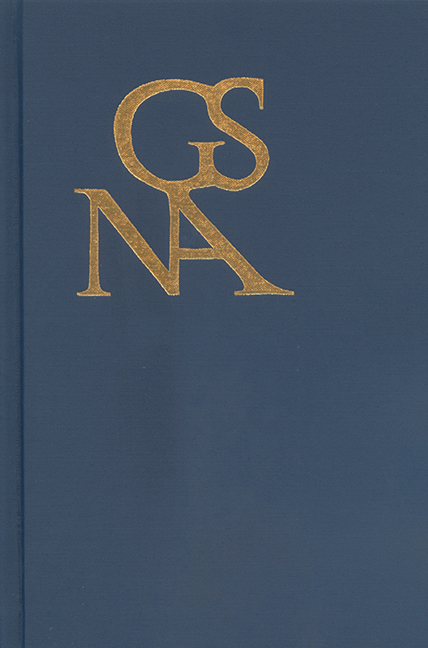Book contents
- Frontmatter
- Contents
- Special Section on Goethe and the Postclassical: Literature, Science, Art, and Philosophy, 1805–1815
- Helena, Then Hell: Faust as Review and Anticipation of Modern Times
- Histrionic Nationality: Implications of the Verse in Faust
- Die Wette in Goethes Faust
- Ecocriticism, the Elements, and the Ascent/Descent into Weather in Goethe's Faust
- Grablegung im Vorhof des Palasts: Groteske Anschaulichkeit in den vorletzten Szenen von Faust II
- Goethes Gnostiker: Fausts vergessener Nihilismus und sein Streben nach Erlösungswissen
- The Unconscious of Nature: Analyzing Disenchantment in Faust I
- Forms of Figuration in Goethe's Faust
- Goethe's Morphology of Knowledge, or the Overgrowth of Nomenclature
- Paraphrasis: Goethe, the Novella, and Forms of Translational Knowledge
- Dramas of Knowledge: The “Fortunate Event” of Recognition
- gegen: Bewegungen durch Goethes “Der Mann von funfzig Jahren”
- “Offenbares Geheimnis” oder “geheime Offenbarung”? Goethes Märchen und die Apokalypse
- Goethe's Green: The “Mixed” Boundary Colors in Zur Farbenlehre
- For Heaven's Sake, I Will Have You Walk into the Dark: Grillparzer's Containment of Beethoven and the Ambivalence of Their Melusina Project
- Imitation, Pleasure, and Aesthetic Education in the Poetics and Comedies of Johann Elias Schlegel
- Feindlich verbündet: Lessing und die Neuen Erweiterungen der Erkenntnis und des Vergnügens
- Juvenalian Satire and the Divided Self in Goethe's “Das Tagebuch”
- Book Reviews
Helena, Then Hell: Faust as Review and Anticipation of Modern Times
from Special Section on Goethe and the Postclassical: Literature, Science, Art, and Philosophy, 1805–1815
Published online by Cambridge University Press: 14 March 2018
- Frontmatter
- Contents
- Special Section on Goethe and the Postclassical: Literature, Science, Art, and Philosophy, 1805–1815
- Helena, Then Hell: Faust as Review and Anticipation of Modern Times
- Histrionic Nationality: Implications of the Verse in Faust
- Die Wette in Goethes Faust
- Ecocriticism, the Elements, and the Ascent/Descent into Weather in Goethe's Faust
- Grablegung im Vorhof des Palasts: Groteske Anschaulichkeit in den vorletzten Szenen von Faust II
- Goethes Gnostiker: Fausts vergessener Nihilismus und sein Streben nach Erlösungswissen
- The Unconscious of Nature: Analyzing Disenchantment in Faust I
- Forms of Figuration in Goethe's Faust
- Goethe's Morphology of Knowledge, or the Overgrowth of Nomenclature
- Paraphrasis: Goethe, the Novella, and Forms of Translational Knowledge
- Dramas of Knowledge: The “Fortunate Event” of Recognition
- gegen: Bewegungen durch Goethes “Der Mann von funfzig Jahren”
- “Offenbares Geheimnis” oder “geheime Offenbarung”? Goethes Märchen und die Apokalypse
- Goethe's Green: The “Mixed” Boundary Colors in Zur Farbenlehre
- For Heaven's Sake, I Will Have You Walk into the Dark: Grillparzer's Containment of Beethoven and the Ambivalence of Their Melusina Project
- Imitation, Pleasure, and Aesthetic Education in the Poetics and Comedies of Johann Elias Schlegel
- Feindlich verbündet: Lessing und die Neuen Erweiterungen der Erkenntnis und des Vergnügens
- Juvenalian Satire and the Divided Self in Goethe's “Das Tagebuch”
- Book Reviews
Summary
GOETHE IS USUALLY NOT RECOGNIZED as an historian although, with Dichtung und Wahrheit and with Geschichte der Farbenlehre, he wrote eminent works of history that far exceed the compass of an autobiography or the chronology of a special branch of optics. When he tried to talk his friend Zelter into writing a history of music, Goethe wrote in 1815: “müßtest Du bei einer bedeutenden Periode anfangen, und vor- und rückwärts arbeiten; das Wahre kann bloß durch seine Geschichte erhoben und erhalten, das Falsche bloß durch seine Geschichte erniedrigt und zerstreut werden.” In a number of his plays, he uses Herder's theory of intertextuality Vom neuern Gebrauch der Mythologie, taking up figures, stories, and problems of the sixteenth century like Götz von Berlichingen, Egmont, Tasso, and Faust, and finishing with the passionate cry for a future in which the problems that cause Götz’, Egmont's, Gretchen's death or Tasso's isolation are solved. These, then, are the questions that the contemporary recipient has to ask himself: would these figures be able to live according to their “prätendierte Freiheit” today? This approach is eminently historical but not in the sense that a historian of the time like Gatterer or Schlözer would have acknowledged as historiography. Goethe consciously establishes a systemic correlation for instance between the introduction of Roman Law and the abolition of the traditional privileges of knighthood in Götz’ time, and the burning question of the 1770s whether a general book of law should be introduced or whether regional traditions of jurisdiction should be preserved. History, here, is not any more magistra vitae but a critique of present times, and present times, inversely, create an understanding for the relevance of historical events and processes: between the contemporary recipient and history, Goethe establishes an organic system of reciprocation that, as a structure, he holds up until his last years. He adopted the approach of conceiving organic systems from Johann Gottfried Herder who in turn had dynamized Johann Heinrich Lambert's “Systematology” of 1764 for his philosophy of language and culture. I will show in this paper that Goethe used this systems approach not only for history but for his theory of colors, for aesthetics, poetry, and even in politics. Faust, as an eminent work of history, and in it, 3,000 years old, Helena, will provide a frame for some excursions into the systems aspect of the other fields just mentioned.
- Type
- Chapter
- Information
- Goethe Yearbook 17 , pp. 3 - 20Publisher: Boydell & BrewerPrint publication year: 2010



